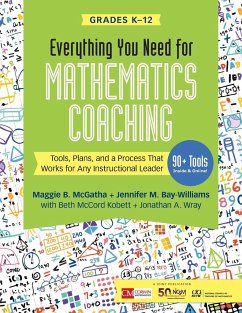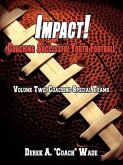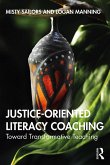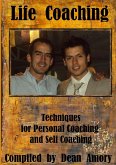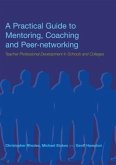Maggie B. McGatha, Jennifer M. Bay-Williams, Beth McCord Kobett
Everything You Need for Mathematics Coaching
Tools, Plans, and a Process That Works for Any Instructional Leader, Grades K-12
Maggie B. McGatha, Jennifer M. Bay-Williams, Beth McCord Kobett
Everything You Need for Mathematics Coaching
Tools, Plans, and a Process That Works for Any Instructional Leader, Grades K-12
- Broschiertes Buch
- Merkliste
- Auf die Merkliste
- Bewerten Bewerten
- Teilen
- Produkt teilen
- Produkterinnerung
- Produkterinnerung
Plan, focus, and lead: Your toolkit for inspiring math teachers What's your go-to resource for guiding teachers to grow mathematics proficiency in their classrooms? This comprehensive toolkit for busy math coaches positions student learning as the focus of all work, and connects the Eight Mathematical Practices for students with NCTM's Eight Effective Teaching Practices to deliver coaching strategies that work. Use the coaching cycle-plan, gather data, reflect-to build trust and rapport with teachers. Navigate coaching conversations. Plan, focus, and facilitate professional learning…mehr
Andere Kunden interessierten sich auch für
![Impact! Coaching Successful Youth Football Impact! Coaching Successful Youth Football]() Derek A. WadeImpact! Coaching Successful Youth Football28,99 €
Derek A. WadeImpact! Coaching Successful Youth Football28,99 €![Life Coaching for Kids Life Coaching for Kids]() Nikki WatsonLife Coaching for Kids41,99 €
Nikki WatsonLife Coaching for Kids41,99 €![A Comprehensive Guide For Coaching Children How To Ski A Comprehensive Guide For Coaching Children How To Ski]() Herbert K NaitoA Comprehensive Guide For Coaching Children How To Ski37,99 €
Herbert K NaitoA Comprehensive Guide For Coaching Children How To Ski37,99 €![Justice-Oriented Literacy Coaching Justice-Oriented Literacy Coaching]() Misty SailorsJustice-Oriented Literacy Coaching67,99 €
Misty SailorsJustice-Oriented Literacy Coaching67,99 €![Insight Journal & Digital Card Deck Insight Journal & Digital Card Deck]() Sarie TaylorInsight Journal & Digital Card Deck86,99 €
Sarie TaylorInsight Journal & Digital Card Deck86,99 €![Techniques for Personal Coaching and Self Coaching Techniques for Personal Coaching and Self Coaching]() Dean AmoryTechniques for Personal Coaching and Self Coaching39,99 €
Dean AmoryTechniques for Personal Coaching and Self Coaching39,99 €![A Practical Guide to Mentoring, Coaching and Peer-networking A Practical Guide to Mentoring, Coaching and Peer-networking]() Geoff HamptonA Practical Guide to Mentoring, Coaching and Peer-networking87,99 €
Geoff HamptonA Practical Guide to Mentoring, Coaching and Peer-networking87,99 €-
-
-
Plan, focus, and lead: Your toolkit for inspiring math teachers What's your go-to resource for guiding teachers to grow mathematics proficiency in their classrooms? This comprehensive toolkit for busy math coaches positions student learning as the focus of all work, and connects the Eight Mathematical Practices for students with NCTM's Eight Effective Teaching Practices to deliver coaching strategies that work. Use the coaching cycle-plan, gather data, reflect-to build trust and rapport with teachers. Navigate coaching conversations. Plan, focus, and facilitate professional learning communities. Includes examples from the field, resources, and a plethora of tools to download and share. Create a professional learning plan that empowers you to lead with clarity and purpose.
Hinweis: Dieser Artikel kann nur an eine deutsche Lieferadresse ausgeliefert werden.
Hinweis: Dieser Artikel kann nur an eine deutsche Lieferadresse ausgeliefert werden.
Produktdetails
- Produktdetails
- Verlag: Corwin
- Seitenzahl: 362
- Erscheinungstermin: 13. April 2018
- Englisch
- Abmessung: 280mm x 216mm x 20mm
- Gewicht: 910g
- ISBN-13: 9781544316987
- ISBN-10: 1544316984
- Artikelnr.: 50446011
- Herstellerkennzeichnung
- Libri GmbH
- Europaallee 1
- 36244 Bad Hersfeld
- gpsr@libri.de
- Verlag: Corwin
- Seitenzahl: 362
- Erscheinungstermin: 13. April 2018
- Englisch
- Abmessung: 280mm x 216mm x 20mm
- Gewicht: 910g
- ISBN-13: 9781544316987
- ISBN-10: 1544316984
- Artikelnr.: 50446011
- Herstellerkennzeichnung
- Libri GmbH
- Europaallee 1
- 36244 Bad Hersfeld
- gpsr@libri.de
Maggie B. McGatha works full time with coaches, teacher leaders, and administrators as a Training Associate for Cognitive Coaching? and Adaptive Schools. At the University of Louisville, she teaches courses on coaching and supporting collaborative groups along with advanced mathematics methods courses. Maggie is a former middle school mathematics teacher, the author of numerous articles, a co-author of Mathematics Coaching: Resources and Tools for Coaches and Leaders, K-12 (Pearson, 2014) and On the Money: Math Activities to Build Financial Literacy, Grades 6-8 (NCTM, 2015). She is active in state and national mathematics organizations including currently serving as the Vice President for the Membership Division (2017-2020) of the Association of Mathematics Teacher Educators (AMTE) and member of the Advisory Board for the Mathematics Institute of Wisconsin. She received her doctorate from Vanderbilt University (Tennessee). Maggie enjoys traveling and spending time with her family, especially her grandkids!
Preface Acknowledgements About the Authors Part 1 Creating a Roadmap: Big Ideas of Coaching, Teaching, and Learning Chapter 1. Coaching for Mathematical Proficiency Leading for Mathematical Proficiency (LMP) Framework Coaching Cycle Getting Started Chapter 2. Implementing Effective Teaching Coach
s Digest Overview of Implementing Effective Teaching Coaching Considerations for Professional Learning Coaching Lessons from The Field Coaching Questions for Discussion Where to Learn More Coach
s Tookit 2.1 Shifts in Classroom Practice Self-Assessment 2.2 Essential Planning Questions for Effective Teaching 2.3 Practices, Shifts, and Zones (Oh My) 2.4 Mathematical Practices by Design 2.5 Lesson Plan Template 2.6 Mathematical Practice Look Fors 2.7 Shifts in Classroom Practice 2.8 Effective Teaching Look Fors 2.9 Noticing Mathematical Practices 2.10 Mapping Teaching Moves to Shifts in Classroom Practice 2.11 Effective Teaching of Mathematics Part II Exploring Zones on the Journey: Professional Learning Focus Areas Chapter 3. Content Kowledge and Worthwhile Tasks Coach
s Digest Overview of Content Knowledge and Worthwhile Tasks Coaching Considerations for Professional Learning Coaching Lessons from the Field Connecting to the Leading For Mathematical Proficiency (LMP) Framework Coaching Questions for Discussion Where to Learn More Coach
s Toolkit 3.1 Connecting Shifts to Content and Worthwhile Tasks Self-Assessment 3.2 Connecting Shifts to Content and Tasks 3.3 Focus on Fluency 3.4 P.I.C.S. Page 3.5 Analyzing Level of Cognitive Demand 3.6 Worthwhile Task Analysis 3.7 Developing Mathematical Proficiency 3.8 Implementing Cognitively Demanding Tasks 3.9 Impact on Students' Emerging Fluency 3.10 Reflecting on Task Implementation Chapter 4. Engaging Students Coach
s Digest Overview of Engaging Students Coaching Considerations for Professional Learning Coaching Lessons from the Field Connecting to the Leading for Mathematical Proficiency (LMP) Framework Coaching Questions for Discussion Where to Learn More Coach
s Toolkit 4.1 Connecting Shifts to Engaging Students Self-Assessment 4.2 Total Participation Technique (TPT) Planning 4.3 Planning or Cooperative Groups 4.4 Engagement Techniques 4.5 Cooperative Groups Data Gathering 4.6 Engagement Techniques Discussion Prompts 4.7 Reflecting on Cooperative Groups 4.8 Analyzing Learning in Cooperative Groups Chapter 5. Questioning and Discourse Coach
s Digest Overview of Questioning and Discourse Coaching Considerations for Professional Learning Coaching Lessons from the Field Connecting to the Leading for Mathematical Proficiency (LMP) Framework Coaching Questions for Discussion Where to Learn More Coach
s Toolkit 5.1 Connecting Shifts to Questioning and Discourse Self-Assessment 5.2 High-Level Thinking Questions 5.3 Questioning Across Lesson Phases 5.4 Questioning Across Lesson Phases (focus on Productive Struggle) 5.5 Bloom's Taxonomy (Revised) and Mathematical Knowledge 5.6 Questioning Patterns 5.7 Wait Time 5.8 Productive Discussion and Talk Moves 5.9 Question and Discourse Discussion Prompts 5.10 Reflecting on Bloom's Taxonomy (Revised) and Mathematical Knowledge Chapter 6. Formative Assessment Coach
s Digest Overview of Formative Assessment Coaching Considerations for Professional Learning Coaching Lessons from the Field Connecting to the Leading for Mathematical Proficiency (LMP) Framework Coaching Questions for Discussion Where to Learn More Coach
s Toolkit 6.1 Connecting Shifts to Formative Assessment Self-Assessment 6.2 Planning for Five "Key Strategies" for Formative Assessment 6.3 Developing Questions to Target Misconceptions 6.4 Using Rubrics for Formative Assessment 6.5 Observing and Providing Feedback 6.6 Observing Students' Thinking 6.7 Observing Students' Representations 6.8 Brief Formative Assessment Interview 6.9 Five "Key Strategies" for Formative Assessment Data Collection 6.10 Using Rubrics for Formative Assessment 6.11 Analyzing Formative Assessment Key Strategies Chapter 7. Analyzing Student Work Coach
s Digest Overview of Analyzing Student Work Coaching Considerations for Professional Learning Coaching Lessons from the Field Connecting to the Leading for Mathematical Proficiency (LMP) Framework Coaching Questions for Discussion Where to Learn More Coach
s Toolkit 7.1 Connecting Shifts to Analyzing Student Work Self-Assessment 7.2 One Day/Many Artifacts Planning 7.3 Planning Task Implementation 7.4 Understanding Student Thinking 7.5 Analyzing One Student's Work 7.6 Analysis of Students' Misconceptions 7.7 Collaborative Analysis Protocol Chapter 8. Differentiating Instruction for All Learners Coach
s Digest Overview of Differentiating Instruction Coaching Considerations for Professional Learning Coaching Lessons from the Field Connecting to the Leading for Mathematical Proficiency (LMP) Framework Coaching Questions for Discussion Where to Learn More Coach
s Toolkit 8.1. Connecting Shifts to Differentiated Instruction Self-Assessment 8.2 Student Diversity 8.3 Meeting Individual Needs 8.4 Different Ways to Differentiate a Lesson 8.5 Opening Closed Tasks 8.6 Focus on Five 8.7 Differentiating Instruction 8.8 Learning from Focus on Five 8.9 Impact of Open /Tiered/Parallel Tasks Chapter 9. Supporting Emergent Multilingual Students Coach
s Digest Overview of Supporting Emergent Multilingual Students Coaching Considerations for Professional Learning Coaching Lessons from the Field Connecting to the Leading for Mathematical Proficiency (LMP) Framework Coaching Questions for Discussion Where to Learn More Coach
s Toolkit 9.1 Connecting Shifts to Supporting Emerging Multilingual Students Self-Assessment 9.2 Culturally Responsive Mathematics Instruction (CRMI) 9.3 Planning Strategies to Support Emergent Multilingual Students 9.4 Diagnostic Interview 9.5 Focus on Culturally Responsive Mathematics Instruction (CRMI) 9.6 Teaching to Support Emergent Multilingual Students 9.7 Reflecting on Support Emergent Multilingual Students 9.8 Reflecting on Using a Diagnostic Interview Chapter 10. Supporting Students with Special Needs Coach
s Digest Overview of Supporting Students with Special Needs Coaching Considerations for Professional Learning Coaching Lessons from the Field Connecting to the Leading for Mathematical Proficiency (LMP) Framework Coaching Questions for Discussion Where to Learn More Coach
s Toolkit 10.1 Connecting Shifts to Supporting Students with Special Needs Self-Assessment 10.2 Challenges and Support Structures 10.3 Structuring a Lesson to Support Students with Special Needs 10.4 Effective Teaching for Students with Special Needs 10.5 Implementing Support Structures for Students with Special Needs 10.6 Reflecting on Effective Teaching for Students with Special Needs 10.7 Reflecting on Structuring a Lesson for Built-In Success Part III Navigating a Successful Journey: Strategies and Tools for You, the Coach Chapter 11. Interacting With Colleagues Coach
s Digest Overview of Interacting with Colleagues Building Trust Establishing Rapport Listening Paraphrasing Posing Questions Where to Learn More Chapter 12. Presenting Professional Development Coach
s Digest Overview of Presenting Professional Development Tips for Presenting Professional Development Coaching Lessons from the Field Where to Learn More Coach
s Toolkit 12.1 Professional Development Overview Planning 12.2 Professional Development Planning Checklist 12.3 Professional Development Planning Template 12.4 Differentiating Professional Development 12.5 Evaluating Professional Development 12.6 Sample Professional Development Activity: Grouping Strategy (P.I.C.S. Page) 12.7 Sample Professional Development Activity: Grouping Strategy (Shape Partners) 12.8 Sample Professional Development Activity: Mathematical Practices Mini-Vignettes 12.9 Sample Professional Development Activity: Mathematical Practices Playing Cards 12.10 Sample Professional Development Activity: Questioning and the Mathematical Practices 12.11 Sample Professional Development Activity: Effective Teaching Practices Chapter 13. Facilitating Professional Learning Communities Coach
s Digest Overview of Facilitating Professional Learning Communities Tips for Facilitating Professional Learning Communities Coaching Lessons from the Field Where to Learn More Coach
s Toolkit 13.1 Meeting Standards Self-Assessment and Reflection 13.2 Facilitator Proficiency Scale 13.3 Sample Facilitation Activity: Appreciative Inquiry Protocol 13.4 Sample Facilitation Activity: Paraphrasing 13.5 Sample Facilitation Activity: Inclusion Strategies 13.6 Sample Facilitation Activity: Task Talk Protocol Appendix: Bookmarks Glossary References
s Digest Overview of Implementing Effective Teaching Coaching Considerations for Professional Learning Coaching Lessons from The Field Coaching Questions for Discussion Where to Learn More Coach
s Tookit 2.1 Shifts in Classroom Practice Self-Assessment 2.2 Essential Planning Questions for Effective Teaching 2.3 Practices, Shifts, and Zones (Oh My) 2.4 Mathematical Practices by Design 2.5 Lesson Plan Template 2.6 Mathematical Practice Look Fors 2.7 Shifts in Classroom Practice 2.8 Effective Teaching Look Fors 2.9 Noticing Mathematical Practices 2.10 Mapping Teaching Moves to Shifts in Classroom Practice 2.11 Effective Teaching of Mathematics Part II Exploring Zones on the Journey: Professional Learning Focus Areas Chapter 3. Content Kowledge and Worthwhile Tasks Coach
s Digest Overview of Content Knowledge and Worthwhile Tasks Coaching Considerations for Professional Learning Coaching Lessons from the Field Connecting to the Leading For Mathematical Proficiency (LMP) Framework Coaching Questions for Discussion Where to Learn More Coach
s Toolkit 3.1 Connecting Shifts to Content and Worthwhile Tasks Self-Assessment 3.2 Connecting Shifts to Content and Tasks 3.3 Focus on Fluency 3.4 P.I.C.S. Page 3.5 Analyzing Level of Cognitive Demand 3.6 Worthwhile Task Analysis 3.7 Developing Mathematical Proficiency 3.8 Implementing Cognitively Demanding Tasks 3.9 Impact on Students' Emerging Fluency 3.10 Reflecting on Task Implementation Chapter 4. Engaging Students Coach
s Digest Overview of Engaging Students Coaching Considerations for Professional Learning Coaching Lessons from the Field Connecting to the Leading for Mathematical Proficiency (LMP) Framework Coaching Questions for Discussion Where to Learn More Coach
s Toolkit 4.1 Connecting Shifts to Engaging Students Self-Assessment 4.2 Total Participation Technique (TPT) Planning 4.3 Planning or Cooperative Groups 4.4 Engagement Techniques 4.5 Cooperative Groups Data Gathering 4.6 Engagement Techniques Discussion Prompts 4.7 Reflecting on Cooperative Groups 4.8 Analyzing Learning in Cooperative Groups Chapter 5. Questioning and Discourse Coach
s Digest Overview of Questioning and Discourse Coaching Considerations for Professional Learning Coaching Lessons from the Field Connecting to the Leading for Mathematical Proficiency (LMP) Framework Coaching Questions for Discussion Where to Learn More Coach
s Toolkit 5.1 Connecting Shifts to Questioning and Discourse Self-Assessment 5.2 High-Level Thinking Questions 5.3 Questioning Across Lesson Phases 5.4 Questioning Across Lesson Phases (focus on Productive Struggle) 5.5 Bloom's Taxonomy (Revised) and Mathematical Knowledge 5.6 Questioning Patterns 5.7 Wait Time 5.8 Productive Discussion and Talk Moves 5.9 Question and Discourse Discussion Prompts 5.10 Reflecting on Bloom's Taxonomy (Revised) and Mathematical Knowledge Chapter 6. Formative Assessment Coach
s Digest Overview of Formative Assessment Coaching Considerations for Professional Learning Coaching Lessons from the Field Connecting to the Leading for Mathematical Proficiency (LMP) Framework Coaching Questions for Discussion Where to Learn More Coach
s Toolkit 6.1 Connecting Shifts to Formative Assessment Self-Assessment 6.2 Planning for Five "Key Strategies" for Formative Assessment 6.3 Developing Questions to Target Misconceptions 6.4 Using Rubrics for Formative Assessment 6.5 Observing and Providing Feedback 6.6 Observing Students' Thinking 6.7 Observing Students' Representations 6.8 Brief Formative Assessment Interview 6.9 Five "Key Strategies" for Formative Assessment Data Collection 6.10 Using Rubrics for Formative Assessment 6.11 Analyzing Formative Assessment Key Strategies Chapter 7. Analyzing Student Work Coach
s Digest Overview of Analyzing Student Work Coaching Considerations for Professional Learning Coaching Lessons from the Field Connecting to the Leading for Mathematical Proficiency (LMP) Framework Coaching Questions for Discussion Where to Learn More Coach
s Toolkit 7.1 Connecting Shifts to Analyzing Student Work Self-Assessment 7.2 One Day/Many Artifacts Planning 7.3 Planning Task Implementation 7.4 Understanding Student Thinking 7.5 Analyzing One Student's Work 7.6 Analysis of Students' Misconceptions 7.7 Collaborative Analysis Protocol Chapter 8. Differentiating Instruction for All Learners Coach
s Digest Overview of Differentiating Instruction Coaching Considerations for Professional Learning Coaching Lessons from the Field Connecting to the Leading for Mathematical Proficiency (LMP) Framework Coaching Questions for Discussion Where to Learn More Coach
s Toolkit 8.1. Connecting Shifts to Differentiated Instruction Self-Assessment 8.2 Student Diversity 8.3 Meeting Individual Needs 8.4 Different Ways to Differentiate a Lesson 8.5 Opening Closed Tasks 8.6 Focus on Five 8.7 Differentiating Instruction 8.8 Learning from Focus on Five 8.9 Impact of Open /Tiered/Parallel Tasks Chapter 9. Supporting Emergent Multilingual Students Coach
s Digest Overview of Supporting Emergent Multilingual Students Coaching Considerations for Professional Learning Coaching Lessons from the Field Connecting to the Leading for Mathematical Proficiency (LMP) Framework Coaching Questions for Discussion Where to Learn More Coach
s Toolkit 9.1 Connecting Shifts to Supporting Emerging Multilingual Students Self-Assessment 9.2 Culturally Responsive Mathematics Instruction (CRMI) 9.3 Planning Strategies to Support Emergent Multilingual Students 9.4 Diagnostic Interview 9.5 Focus on Culturally Responsive Mathematics Instruction (CRMI) 9.6 Teaching to Support Emergent Multilingual Students 9.7 Reflecting on Support Emergent Multilingual Students 9.8 Reflecting on Using a Diagnostic Interview Chapter 10. Supporting Students with Special Needs Coach
s Digest Overview of Supporting Students with Special Needs Coaching Considerations for Professional Learning Coaching Lessons from the Field Connecting to the Leading for Mathematical Proficiency (LMP) Framework Coaching Questions for Discussion Where to Learn More Coach
s Toolkit 10.1 Connecting Shifts to Supporting Students with Special Needs Self-Assessment 10.2 Challenges and Support Structures 10.3 Structuring a Lesson to Support Students with Special Needs 10.4 Effective Teaching for Students with Special Needs 10.5 Implementing Support Structures for Students with Special Needs 10.6 Reflecting on Effective Teaching for Students with Special Needs 10.7 Reflecting on Structuring a Lesson for Built-In Success Part III Navigating a Successful Journey: Strategies and Tools for You, the Coach Chapter 11. Interacting With Colleagues Coach
s Digest Overview of Interacting with Colleagues Building Trust Establishing Rapport Listening Paraphrasing Posing Questions Where to Learn More Chapter 12. Presenting Professional Development Coach
s Digest Overview of Presenting Professional Development Tips for Presenting Professional Development Coaching Lessons from the Field Where to Learn More Coach
s Toolkit 12.1 Professional Development Overview Planning 12.2 Professional Development Planning Checklist 12.3 Professional Development Planning Template 12.4 Differentiating Professional Development 12.5 Evaluating Professional Development 12.6 Sample Professional Development Activity: Grouping Strategy (P.I.C.S. Page) 12.7 Sample Professional Development Activity: Grouping Strategy (Shape Partners) 12.8 Sample Professional Development Activity: Mathematical Practices Mini-Vignettes 12.9 Sample Professional Development Activity: Mathematical Practices Playing Cards 12.10 Sample Professional Development Activity: Questioning and the Mathematical Practices 12.11 Sample Professional Development Activity: Effective Teaching Practices Chapter 13. Facilitating Professional Learning Communities Coach
s Digest Overview of Facilitating Professional Learning Communities Tips for Facilitating Professional Learning Communities Coaching Lessons from the Field Where to Learn More Coach
s Toolkit 13.1 Meeting Standards Self-Assessment and Reflection 13.2 Facilitator Proficiency Scale 13.3 Sample Facilitation Activity: Appreciative Inquiry Protocol 13.4 Sample Facilitation Activity: Paraphrasing 13.5 Sample Facilitation Activity: Inclusion Strategies 13.6 Sample Facilitation Activity: Task Talk Protocol Appendix: Bookmarks Glossary References
Preface Acknowledgements About the Authors Part 1 Creating a Roadmap: Big Ideas of Coaching, Teaching, and Learning Chapter 1. Coaching for Mathematical Proficiency Leading for Mathematical Proficiency (LMP) Framework Coaching Cycle Getting Started Chapter 2. Implementing Effective Teaching Coach
s Digest Overview of Implementing Effective Teaching Coaching Considerations for Professional Learning Coaching Lessons from The Field Coaching Questions for Discussion Where to Learn More Coach
s Tookit 2.1 Shifts in Classroom Practice Self-Assessment 2.2 Essential Planning Questions for Effective Teaching 2.3 Practices, Shifts, and Zones (Oh My) 2.4 Mathematical Practices by Design 2.5 Lesson Plan Template 2.6 Mathematical Practice Look Fors 2.7 Shifts in Classroom Practice 2.8 Effective Teaching Look Fors 2.9 Noticing Mathematical Practices 2.10 Mapping Teaching Moves to Shifts in Classroom Practice 2.11 Effective Teaching of Mathematics Part II Exploring Zones on the Journey: Professional Learning Focus Areas Chapter 3. Content Kowledge and Worthwhile Tasks Coach
s Digest Overview of Content Knowledge and Worthwhile Tasks Coaching Considerations for Professional Learning Coaching Lessons from the Field Connecting to the Leading For Mathematical Proficiency (LMP) Framework Coaching Questions for Discussion Where to Learn More Coach
s Toolkit 3.1 Connecting Shifts to Content and Worthwhile Tasks Self-Assessment 3.2 Connecting Shifts to Content and Tasks 3.3 Focus on Fluency 3.4 P.I.C.S. Page 3.5 Analyzing Level of Cognitive Demand 3.6 Worthwhile Task Analysis 3.7 Developing Mathematical Proficiency 3.8 Implementing Cognitively Demanding Tasks 3.9 Impact on Students' Emerging Fluency 3.10 Reflecting on Task Implementation Chapter 4. Engaging Students Coach
s Digest Overview of Engaging Students Coaching Considerations for Professional Learning Coaching Lessons from the Field Connecting to the Leading for Mathematical Proficiency (LMP) Framework Coaching Questions for Discussion Where to Learn More Coach
s Toolkit 4.1 Connecting Shifts to Engaging Students Self-Assessment 4.2 Total Participation Technique (TPT) Planning 4.3 Planning or Cooperative Groups 4.4 Engagement Techniques 4.5 Cooperative Groups Data Gathering 4.6 Engagement Techniques Discussion Prompts 4.7 Reflecting on Cooperative Groups 4.8 Analyzing Learning in Cooperative Groups Chapter 5. Questioning and Discourse Coach
s Digest Overview of Questioning and Discourse Coaching Considerations for Professional Learning Coaching Lessons from the Field Connecting to the Leading for Mathematical Proficiency (LMP) Framework Coaching Questions for Discussion Where to Learn More Coach
s Toolkit 5.1 Connecting Shifts to Questioning and Discourse Self-Assessment 5.2 High-Level Thinking Questions 5.3 Questioning Across Lesson Phases 5.4 Questioning Across Lesson Phases (focus on Productive Struggle) 5.5 Bloom's Taxonomy (Revised) and Mathematical Knowledge 5.6 Questioning Patterns 5.7 Wait Time 5.8 Productive Discussion and Talk Moves 5.9 Question and Discourse Discussion Prompts 5.10 Reflecting on Bloom's Taxonomy (Revised) and Mathematical Knowledge Chapter 6. Formative Assessment Coach
s Digest Overview of Formative Assessment Coaching Considerations for Professional Learning Coaching Lessons from the Field Connecting to the Leading for Mathematical Proficiency (LMP) Framework Coaching Questions for Discussion Where to Learn More Coach
s Toolkit 6.1 Connecting Shifts to Formative Assessment Self-Assessment 6.2 Planning for Five "Key Strategies" for Formative Assessment 6.3 Developing Questions to Target Misconceptions 6.4 Using Rubrics for Formative Assessment 6.5 Observing and Providing Feedback 6.6 Observing Students' Thinking 6.7 Observing Students' Representations 6.8 Brief Formative Assessment Interview 6.9 Five "Key Strategies" for Formative Assessment Data Collection 6.10 Using Rubrics for Formative Assessment 6.11 Analyzing Formative Assessment Key Strategies Chapter 7. Analyzing Student Work Coach
s Digest Overview of Analyzing Student Work Coaching Considerations for Professional Learning Coaching Lessons from the Field Connecting to the Leading for Mathematical Proficiency (LMP) Framework Coaching Questions for Discussion Where to Learn More Coach
s Toolkit 7.1 Connecting Shifts to Analyzing Student Work Self-Assessment 7.2 One Day/Many Artifacts Planning 7.3 Planning Task Implementation 7.4 Understanding Student Thinking 7.5 Analyzing One Student's Work 7.6 Analysis of Students' Misconceptions 7.7 Collaborative Analysis Protocol Chapter 8. Differentiating Instruction for All Learners Coach
s Digest Overview of Differentiating Instruction Coaching Considerations for Professional Learning Coaching Lessons from the Field Connecting to the Leading for Mathematical Proficiency (LMP) Framework Coaching Questions for Discussion Where to Learn More Coach
s Toolkit 8.1. Connecting Shifts to Differentiated Instruction Self-Assessment 8.2 Student Diversity 8.3 Meeting Individual Needs 8.4 Different Ways to Differentiate a Lesson 8.5 Opening Closed Tasks 8.6 Focus on Five 8.7 Differentiating Instruction 8.8 Learning from Focus on Five 8.9 Impact of Open /Tiered/Parallel Tasks Chapter 9. Supporting Emergent Multilingual Students Coach
s Digest Overview of Supporting Emergent Multilingual Students Coaching Considerations for Professional Learning Coaching Lessons from the Field Connecting to the Leading for Mathematical Proficiency (LMP) Framework Coaching Questions for Discussion Where to Learn More Coach
s Toolkit 9.1 Connecting Shifts to Supporting Emerging Multilingual Students Self-Assessment 9.2 Culturally Responsive Mathematics Instruction (CRMI) 9.3 Planning Strategies to Support Emergent Multilingual Students 9.4 Diagnostic Interview 9.5 Focus on Culturally Responsive Mathematics Instruction (CRMI) 9.6 Teaching to Support Emergent Multilingual Students 9.7 Reflecting on Support Emergent Multilingual Students 9.8 Reflecting on Using a Diagnostic Interview Chapter 10. Supporting Students with Special Needs Coach
s Digest Overview of Supporting Students with Special Needs Coaching Considerations for Professional Learning Coaching Lessons from the Field Connecting to the Leading for Mathematical Proficiency (LMP) Framework Coaching Questions for Discussion Where to Learn More Coach
s Toolkit 10.1 Connecting Shifts to Supporting Students with Special Needs Self-Assessment 10.2 Challenges and Support Structures 10.3 Structuring a Lesson to Support Students with Special Needs 10.4 Effective Teaching for Students with Special Needs 10.5 Implementing Support Structures for Students with Special Needs 10.6 Reflecting on Effective Teaching for Students with Special Needs 10.7 Reflecting on Structuring a Lesson for Built-In Success Part III Navigating a Successful Journey: Strategies and Tools for You, the Coach Chapter 11. Interacting With Colleagues Coach
s Digest Overview of Interacting with Colleagues Building Trust Establishing Rapport Listening Paraphrasing Posing Questions Where to Learn More Chapter 12. Presenting Professional Development Coach
s Digest Overview of Presenting Professional Development Tips for Presenting Professional Development Coaching Lessons from the Field Where to Learn More Coach
s Toolkit 12.1 Professional Development Overview Planning 12.2 Professional Development Planning Checklist 12.3 Professional Development Planning Template 12.4 Differentiating Professional Development 12.5 Evaluating Professional Development 12.6 Sample Professional Development Activity: Grouping Strategy (P.I.C.S. Page) 12.7 Sample Professional Development Activity: Grouping Strategy (Shape Partners) 12.8 Sample Professional Development Activity: Mathematical Practices Mini-Vignettes 12.9 Sample Professional Development Activity: Mathematical Practices Playing Cards 12.10 Sample Professional Development Activity: Questioning and the Mathematical Practices 12.11 Sample Professional Development Activity: Effective Teaching Practices Chapter 13. Facilitating Professional Learning Communities Coach
s Digest Overview of Facilitating Professional Learning Communities Tips for Facilitating Professional Learning Communities Coaching Lessons from the Field Where to Learn More Coach
s Toolkit 13.1 Meeting Standards Self-Assessment and Reflection 13.2 Facilitator Proficiency Scale 13.3 Sample Facilitation Activity: Appreciative Inquiry Protocol 13.4 Sample Facilitation Activity: Paraphrasing 13.5 Sample Facilitation Activity: Inclusion Strategies 13.6 Sample Facilitation Activity: Task Talk Protocol Appendix: Bookmarks Glossary References
s Digest Overview of Implementing Effective Teaching Coaching Considerations for Professional Learning Coaching Lessons from The Field Coaching Questions for Discussion Where to Learn More Coach
s Tookit 2.1 Shifts in Classroom Practice Self-Assessment 2.2 Essential Planning Questions for Effective Teaching 2.3 Practices, Shifts, and Zones (Oh My) 2.4 Mathematical Practices by Design 2.5 Lesson Plan Template 2.6 Mathematical Practice Look Fors 2.7 Shifts in Classroom Practice 2.8 Effective Teaching Look Fors 2.9 Noticing Mathematical Practices 2.10 Mapping Teaching Moves to Shifts in Classroom Practice 2.11 Effective Teaching of Mathematics Part II Exploring Zones on the Journey: Professional Learning Focus Areas Chapter 3. Content Kowledge and Worthwhile Tasks Coach
s Digest Overview of Content Knowledge and Worthwhile Tasks Coaching Considerations for Professional Learning Coaching Lessons from the Field Connecting to the Leading For Mathematical Proficiency (LMP) Framework Coaching Questions for Discussion Where to Learn More Coach
s Toolkit 3.1 Connecting Shifts to Content and Worthwhile Tasks Self-Assessment 3.2 Connecting Shifts to Content and Tasks 3.3 Focus on Fluency 3.4 P.I.C.S. Page 3.5 Analyzing Level of Cognitive Demand 3.6 Worthwhile Task Analysis 3.7 Developing Mathematical Proficiency 3.8 Implementing Cognitively Demanding Tasks 3.9 Impact on Students' Emerging Fluency 3.10 Reflecting on Task Implementation Chapter 4. Engaging Students Coach
s Digest Overview of Engaging Students Coaching Considerations for Professional Learning Coaching Lessons from the Field Connecting to the Leading for Mathematical Proficiency (LMP) Framework Coaching Questions for Discussion Where to Learn More Coach
s Toolkit 4.1 Connecting Shifts to Engaging Students Self-Assessment 4.2 Total Participation Technique (TPT) Planning 4.3 Planning or Cooperative Groups 4.4 Engagement Techniques 4.5 Cooperative Groups Data Gathering 4.6 Engagement Techniques Discussion Prompts 4.7 Reflecting on Cooperative Groups 4.8 Analyzing Learning in Cooperative Groups Chapter 5. Questioning and Discourse Coach
s Digest Overview of Questioning and Discourse Coaching Considerations for Professional Learning Coaching Lessons from the Field Connecting to the Leading for Mathematical Proficiency (LMP) Framework Coaching Questions for Discussion Where to Learn More Coach
s Toolkit 5.1 Connecting Shifts to Questioning and Discourse Self-Assessment 5.2 High-Level Thinking Questions 5.3 Questioning Across Lesson Phases 5.4 Questioning Across Lesson Phases (focus on Productive Struggle) 5.5 Bloom's Taxonomy (Revised) and Mathematical Knowledge 5.6 Questioning Patterns 5.7 Wait Time 5.8 Productive Discussion and Talk Moves 5.9 Question and Discourse Discussion Prompts 5.10 Reflecting on Bloom's Taxonomy (Revised) and Mathematical Knowledge Chapter 6. Formative Assessment Coach
s Digest Overview of Formative Assessment Coaching Considerations for Professional Learning Coaching Lessons from the Field Connecting to the Leading for Mathematical Proficiency (LMP) Framework Coaching Questions for Discussion Where to Learn More Coach
s Toolkit 6.1 Connecting Shifts to Formative Assessment Self-Assessment 6.2 Planning for Five "Key Strategies" for Formative Assessment 6.3 Developing Questions to Target Misconceptions 6.4 Using Rubrics for Formative Assessment 6.5 Observing and Providing Feedback 6.6 Observing Students' Thinking 6.7 Observing Students' Representations 6.8 Brief Formative Assessment Interview 6.9 Five "Key Strategies" for Formative Assessment Data Collection 6.10 Using Rubrics for Formative Assessment 6.11 Analyzing Formative Assessment Key Strategies Chapter 7. Analyzing Student Work Coach
s Digest Overview of Analyzing Student Work Coaching Considerations for Professional Learning Coaching Lessons from the Field Connecting to the Leading for Mathematical Proficiency (LMP) Framework Coaching Questions for Discussion Where to Learn More Coach
s Toolkit 7.1 Connecting Shifts to Analyzing Student Work Self-Assessment 7.2 One Day/Many Artifacts Planning 7.3 Planning Task Implementation 7.4 Understanding Student Thinking 7.5 Analyzing One Student's Work 7.6 Analysis of Students' Misconceptions 7.7 Collaborative Analysis Protocol Chapter 8. Differentiating Instruction for All Learners Coach
s Digest Overview of Differentiating Instruction Coaching Considerations for Professional Learning Coaching Lessons from the Field Connecting to the Leading for Mathematical Proficiency (LMP) Framework Coaching Questions for Discussion Where to Learn More Coach
s Toolkit 8.1. Connecting Shifts to Differentiated Instruction Self-Assessment 8.2 Student Diversity 8.3 Meeting Individual Needs 8.4 Different Ways to Differentiate a Lesson 8.5 Opening Closed Tasks 8.6 Focus on Five 8.7 Differentiating Instruction 8.8 Learning from Focus on Five 8.9 Impact of Open /Tiered/Parallel Tasks Chapter 9. Supporting Emergent Multilingual Students Coach
s Digest Overview of Supporting Emergent Multilingual Students Coaching Considerations for Professional Learning Coaching Lessons from the Field Connecting to the Leading for Mathematical Proficiency (LMP) Framework Coaching Questions for Discussion Where to Learn More Coach
s Toolkit 9.1 Connecting Shifts to Supporting Emerging Multilingual Students Self-Assessment 9.2 Culturally Responsive Mathematics Instruction (CRMI) 9.3 Planning Strategies to Support Emergent Multilingual Students 9.4 Diagnostic Interview 9.5 Focus on Culturally Responsive Mathematics Instruction (CRMI) 9.6 Teaching to Support Emergent Multilingual Students 9.7 Reflecting on Support Emergent Multilingual Students 9.8 Reflecting on Using a Diagnostic Interview Chapter 10. Supporting Students with Special Needs Coach
s Digest Overview of Supporting Students with Special Needs Coaching Considerations for Professional Learning Coaching Lessons from the Field Connecting to the Leading for Mathematical Proficiency (LMP) Framework Coaching Questions for Discussion Where to Learn More Coach
s Toolkit 10.1 Connecting Shifts to Supporting Students with Special Needs Self-Assessment 10.2 Challenges and Support Structures 10.3 Structuring a Lesson to Support Students with Special Needs 10.4 Effective Teaching for Students with Special Needs 10.5 Implementing Support Structures for Students with Special Needs 10.6 Reflecting on Effective Teaching for Students with Special Needs 10.7 Reflecting on Structuring a Lesson for Built-In Success Part III Navigating a Successful Journey: Strategies and Tools for You, the Coach Chapter 11. Interacting With Colleagues Coach
s Digest Overview of Interacting with Colleagues Building Trust Establishing Rapport Listening Paraphrasing Posing Questions Where to Learn More Chapter 12. Presenting Professional Development Coach
s Digest Overview of Presenting Professional Development Tips for Presenting Professional Development Coaching Lessons from the Field Where to Learn More Coach
s Toolkit 12.1 Professional Development Overview Planning 12.2 Professional Development Planning Checklist 12.3 Professional Development Planning Template 12.4 Differentiating Professional Development 12.5 Evaluating Professional Development 12.6 Sample Professional Development Activity: Grouping Strategy (P.I.C.S. Page) 12.7 Sample Professional Development Activity: Grouping Strategy (Shape Partners) 12.8 Sample Professional Development Activity: Mathematical Practices Mini-Vignettes 12.9 Sample Professional Development Activity: Mathematical Practices Playing Cards 12.10 Sample Professional Development Activity: Questioning and the Mathematical Practices 12.11 Sample Professional Development Activity: Effective Teaching Practices Chapter 13. Facilitating Professional Learning Communities Coach
s Digest Overview of Facilitating Professional Learning Communities Tips for Facilitating Professional Learning Communities Coaching Lessons from the Field Where to Learn More Coach
s Toolkit 13.1 Meeting Standards Self-Assessment and Reflection 13.2 Facilitator Proficiency Scale 13.3 Sample Facilitation Activity: Appreciative Inquiry Protocol 13.4 Sample Facilitation Activity: Paraphrasing 13.5 Sample Facilitation Activity: Inclusion Strategies 13.6 Sample Facilitation Activity: Task Talk Protocol Appendix: Bookmarks Glossary References

